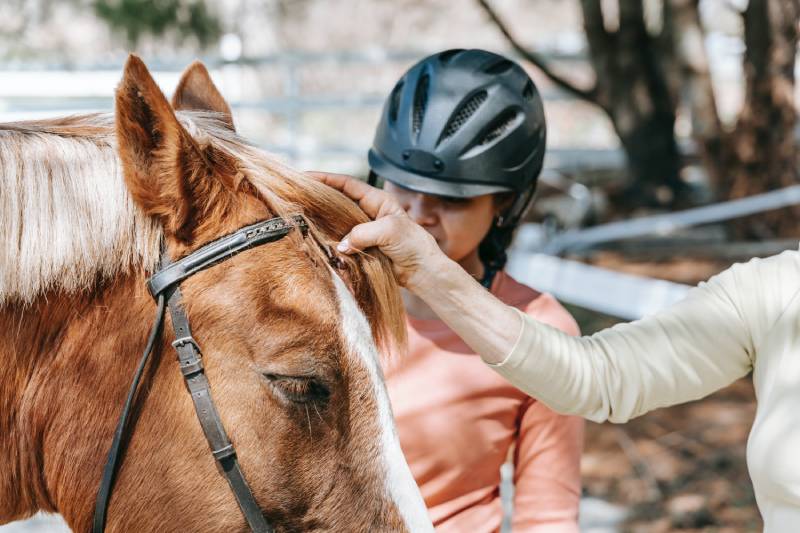
Animals are often used to help humans deal with various mental and physical conditions. While dogs typically are the first to come to mind when it comes to therapy animals, horses have certainly paved their way to success through equine therapy.
Equine therapy for physical conditions dates back to the 1960s, while mental health treatment didn’t begin until the 1990s. Treatment is done under the supervision of professionals. There are different types of equine therapy offered, each of which is beneficial to the conditions they are aimed at treating.
Continue reading to learn more about the incredible health benefits that equine therapy can offer and a more in-depth overview of this type of therapy and how it can help a variety of people.
The 8 Amazing Health Benefits of Equine Therapy
1. Aids in Balance and Gross Motor Skills

When riding a horse, one must find their center of balance and line it up with the horse’s as they move. Equine therapy will utilize the natural gait of the horses to help patients maintain balance and enhance their gross motor skills while riding. This is done under the supervision of physical and/or occupational therapists that are trained in equine therapy.
2. Improves Posture
Learning to ride a horse involves maintaining a proper form to sit comfortably in the saddle and maintain your center of balance. Whether someone is suffering from a disability or has naturally bad posture, equine therapy can help.
Posture is a focus in equine therapy known as hippotherapy. Physical and occupational therapists will help the rider understand the correct posture and will work to help them attain it during their sessions.
3. Increases Muscle Tone and Strength

Riding a horse is considered a moderate form of exercise that has many physical health benefits. Not only does it engage your core, but it also promotes increased muscle tone throughout the body. This is a full-body workout and consistent riding has shown much promise in muscle growth and strengthening.
4. Improves Management of Stress and Anxiety
Many people that struggle with stress and anxiety may avoid responsibilities or other activities due to feeling overwhelmed or over-stimulated. This can be improved through interactions with horses because the therapy is based on setting a care plan, taking care of the responsibility, and properly directing focus on the task rather than their anxiety.
Horses are also great for reducing stress. Science shows that being around animals can help release endorphins, which are chemicals in the brain responsible for feeling good. This is also associated with decreases in cortisol which is the hormone directly related to stress.
Once a person becomes comfortable riding, it is also a very soothing and relaxing experience. It allows the rider to spend quality time with an animal they share a bond with and enjoy the shared experience.
5. Increases Confidence and Self Esteem

Unlike humans, horses are not judgmental and show no bias. They mirror a person’s energy and react to the behavior and emotions of those around them. They do not care what you look like or the mistakes you’ve made.
This type of presence helps people from all walks of life increase their confidence and improve their self-image. Learning to ride, gaining control of the situation, improving upon skills, and overcoming challenges also contribute to confidence building, leadership skills, and better self-esteem.
6. Builds Trust
Frequently interacting with and riding horses will help individuals establish a sense of trust. After a while, the patient participating in equine therapy will establish a sense of safety and begin to trust the horse. The horse will also begin to build a level of trust with the rider.
This type of bond goes both ways and can be life changing. These animals are incredible and can share very powerful bonds with their human companions.
7. Aids in Impulse Control and Self Awareness

Because horses tend to mirror the patient’s behavior, physical movements, and emotions, it helps a person become more self-aware. Having their feelings bounced back at them not only makes a person realize that they need to self-regulate, but also helps them feel understood. This helps increase overall self-awareness and may even help aid in impulse control over time.
8. Enhances Communication and Social Skills
The bond between the horse and rider leads to incredible social and communication skills that can translate over into everyday life. For those lacking in these skills, it can be much easier to establish this type of connection with an animal that doesn’t make them feel vulnerable in the way that other people do.
The communication between the patient and the horse is established through energy and body language, which can be much more influential than words. As the patient becomes more aware of how their energy, emotions, and body language can speak volumes to the horse, it can aid in other social situations.
The Purpose of Equine Therapy
Equine therapy is an experimental treatment for a variety of physical and mental conditions based on interactions and activities involving horses. These therapies are done under the guidance of professionals including mental health professionals, occupational therapists, physical therapists, and speech therapists.
Different forms of equine therapy may be used depending on the patient’s needs, these include:
Equine-Assisted Psychotherapy (EAP)

This type of therapy focuses on individuals with mental health issues, substance abuse disorders, cognitive issues, and other disorders. EAP still involves talk therapy and allows clients to use multiple senses to identify and process emotional issues.
The horses and the environmental setting help put a relaxing, positive spin on the therapy session. During EAP sessions, clients will not only ride but will work with the horses in all aspects of care as a mental health professional leads the therapy session.
Hippotherapy
Hippotherapy involves physical, occupational, and speech therapies that are led by licensed professionals and a certified equine specialist. This type of therapy is aimed at assisting patients with neurological disabilities, neuromuscular disorders, and other disabilities.
The therapist uses the movements of the horse to provide carefully graded motor and sensory input to improve sensory processing and neurological function. This therapy also puts a focus on gross motor skills, balance, coordination, and overall bodily control.
Therapeutic Riding

Therapeutic riding is often considered an Equine-Assisted Activity, or EAA rather than Equine Therapy. Therapeutic riding involves recreational riding lessons that have been adapted for people with disabilities.
These lessons are led by a certified therapeutic horseback riding instructor and are typically taught in a group setting. Because it is considered recreational, therapeutic riding is generally not covered by health insurance.
Conditions Treated with Equine Therapy
Research shows that equine therapy is useful for children, teens, adults, families, and even groups of people. There are a wide variety of physical and mental disorders that can benefit from equine-assisted therapies.

Final Thoughts
Horses have been used by humans for centuries to perform a wide range of tasks. Not only is horseback riding considered a moderately intense exercise with plenty of physical benefits, but it also has many mental health benefits. Being around animals in general is also scientifically proven to aid with mental and physical health.
The success of equine therapy has caused this industry to become increasingly popular for those that suffer from a variety of physical and mental health conditions, and the science behind it is quite promising.
Featured Image Credit: МаринаДымова, Pixabay







